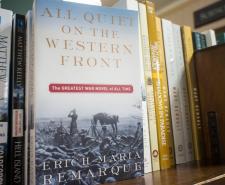
Read more about WW1

It doesn’t take much to make an atomic bomb. At least, not anymore.
That’s the unsettling thread running through The Atomic Bazaar, William Langewiesche’s taut, quietly terrifying exploration of how nuclear weapons might not just fall into the wrong hands, but how they already have.
His publisher describes the book as 'the story of the inexorable drift of nuclear weapons technology from the hands of the rich into the hands of the poor' and at Sky HISTORY, we can testify that it’s just as unsettling as it sounds.
Langewiesche, an award-winning American author and journalist, challenges the images most people have of sleek missile silos controlled by superpower governments. Instead, he lifts the curtain on a far messier world. Think former Soviet labs left half-guarded, disgruntled physicists with PhDs and no pension and uranium shipments that vanish at borders no one’s watching closely.
The book, first published in 2007, is a heavy read. Not because it’s overly technical (Langewiesche is anything but dry) but because its implications are alarmingly real.
He doesn’t speculate about if nuclear weapons could go rogue. He shows us how they already have. And goes even deeper with an examination of the consequences this could have for nuclear terrorism.
One of his most frightening case studies is the career of Pakistani nuclear physicist, Abdul Qadeer Khan. If Oppenheimer is considered the ‘Father of the Atomic Bomb’, Khan is the ‘Father of Pakistan's Atomic Weapons Program’ and he lives up to his reputation.
Khan helped mastermind the theft of highly classified centrifuge designs and nuclear plans which were then sold to Iran, North Korea and other potentially hostile countries.
What Langewiesche captures so well in his book is how Khan’s story exposed a broader truth. That nuclear knowledge, once the sole property of governments and physicists in white coats, had entered the black market. The so-called 'nuclear club' of WWII and the years following was no longer closed.
Langewiesche doesn’t deal in sci-fi hypotheticals. He visits nuclear smuggling routes in Turkey as well as supposedly 'closed cities' in Russia where highly enriched, weapon-grade uranium and plutonium is available to buy for a steal.
How did this come to be? After the collapse of the Soviet Union, staff working at the former nuclear and weapons development sites were left unpaid and overlooked. Some sold what they could. Some just walked away and left the doors unlocked.
Either way, it unleashed a nuclear threat no longer confined to nation-states. Interviews with technicians, smugglers and spies tie the book together and paint a picture of what’s already unfolding, and even worse, what’s possible.
Langewiesche knows his stuff. He’s remembered as a 'master of long-form journalism' and had quite the resume, with stints as a national correspondent for The Atlantic, international correspondent for Vanity Fair and a writer-at-large for The New York Times Magazine.
His message?
Arms are the ultimate commodity in a world where nuclear weapons are readily available. They’re easier and cheaper than ever to manufacture which means that for unstable and undeveloped nations, terror groups and other hostile buyers, nuclear-powered weapons of mass destruction are up for grabs.
The Atomic Bazaar may have been published in 2007, but there’s no doubt Langewiesche was ahead of his time.
Given the current political climate, the book is worth revisiting. Not just for what it says about the past, but what it quietly predicts about our future.
Langewiesche’s argument is deceptively simple: the real nuclear threat isn’t global war. It’s access. The possibility (no longer hypothetical) that rogue individuals, small groups or even disempowered countries might assemble the components of a nuclear device, not through government funding, but through persistence, contacts and cash.
Langewiesche reminds us that it’s not a matter of if, but when.
The Atomic Bazaar is a non-fiction exploration of how nuclear material moves through the black market. Atomic, the new Sky Original series, takes that reality and spins it into a fast-paced, fictional thriller. Inspired by the book, the show follows two unlikely allies caught in a cartel’s plot to smuggle uranium across North Africa, with the fate of humanity hanging in the balance.
Want more like this? Subscribe to the Sky HISTORY newsletter and get the latest articles, show releases and more, direct to your inbox.